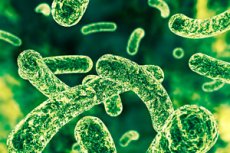
大约五分之一的癌症患者受益于免疫疗法,这是一种利用免疫系统对抗癌症的治疗方法。这种方法在治疗肺癌和黑色素瘤方面已取得显著成功。为了挖掘其潜力,研究人员正在探索改进免疫疗法的策略,以期帮助更多对免疫疗法反应不佳的癌症患者。
如今,圣路易斯华盛顿大学医学院的研究人员发现,一种名为“瘤胃球菌”(Ruminococcus gnavus)的肠道细菌菌株可以增强小鼠癌症免疫疗法的效果。这项发表在《科学免疫学》(Science Immunology)杂志上的研究,为利用肠道微生物释放免疫疗法抗癌潜力提供了一种新策略。
“微生物群在调动人体免疫系统攻击癌细胞方面发挥着重要作用,”资深研究作者、罗伯特·洛克·贝利武病理学教授马可·科隆纳 (Marco Colonna) 医学博士解释说。
“我们的研究结果揭示了一种帮助免疫疗法药物杀死小鼠肿瘤的肠道细菌。鉴定这些微生物伙伴是开发益生菌的重要一步,益生菌可以提高免疫疗法药物的有效性,使更多癌症患者受益。”
癌症免疫疗法利用人体的免疫细胞来靶向并摧毁肿瘤。其中一种疗法是使用免疫检查点抑制剂来消除抑制免疫T细胞的天然“刹车”,从而防止其对身体造成损害。然而,一些肿瘤会通过抑制攻击性免疫细胞来对抗这种疗法,从而降低这些抑制剂的疗效。
Colonna 和第一合著者 Martina Molgor 博士此前曾与同事 Robert D. Schreiber 博士合作,采用双管齐下的抑制方法彻底根除了小鼠体内的肉瘤。
研究人员抑制了肿瘤巨噬细胞产生的一种蛋白质TREM2,以阻止T细胞攻击正在生长的肿瘤。随后,他们证实,当TREM2被阻断时,免疫疗法药物的疗效会更高。结果表明,TREM2降低了免疫疗法的有效性。
在这项新研究的基础实验中,科学家们发现了一个令人惊讶的现象。当缺乏TREM2的小鼠与含有该蛋白的小鼠同住时,它们对检查点抑制剂表现出了类似的积极反应。这一结果的出现,是因为研究人员改变了常规方案,即在用抑制剂治疗小鼠之前将小鼠分开。
小鼠共同生活会导致微生物交换。研究人员推测,这种影响可能是由于肠道细菌的交换所致。
研究人员与医学博士 Jeffrey I. Gordon 和本文第一作者 Blanda Di Lucia 博士合作,研究了成功接受免疫疗法治疗的小鼠肠道中的微生物。他们发现,相比于对疗法没有反应的小鼠,小鼠肠道中的瘤胃球菌 (Ruminococcus gnavus) 数量有所增加。
科隆纳解释说,在对免疫疗法反应良好的癌症患者的肠道菌群中发现了R. gnavus。临床试验中,来自此类患者的粪便移植帮助一些对免疫疗法无反应的患者获益。
包括第一合著者兼研究生达里亚·坎塔科娃(Daria Khantakova)在内的研究人员将R. gnavus注射到小鼠体内,然后用检查点抑制剂治疗肿瘤。即使TREM2作为武器削弱免疫疗法的效果,肿瘤仍然缩小。
爱迪生家庭基因组科学与系统生物学中心主任戈登指出,越来越多的证据表明,微生物组能够增强免疫疗法。鉴定出像R. gnavus这样的相关菌种,或将有助于开发下一代益生菌,这些益生菌可以与免疫疗法协同作用,从而改善癌症治疗。
科学家们目前的目标是了解R. gnavus如何促进肿瘤排斥,这可能揭示出帮助癌症患者的新方法。例如,如果这种微生物在消化过程中产生一种激活免疫的代谢物,就有可能利用这些代谢物作为免疫疗法的增强剂。
科隆纳表示,微生物也可以从肠道进入肿瘤,引发肿瘤的免疫反应,或激活肠道T细胞,这些T细胞随后迁移到肿瘤并发起攻击。研究人员正在探索这三种可能性。

